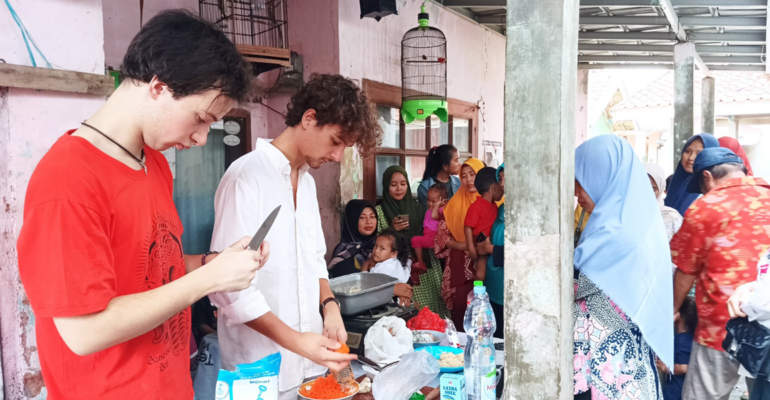Two French Students Demonstrate their Cooking at IPB University’s School of Quality

There was something different at the seventh meeting (23/11) of IPB University’s Quality Family School. Two French students participated in a cooking demonstration activity held in Balumbangjaya Village, Bogor City, West Java.
Through the Quality Family School programme, the Directorate of Agromaritime Community Development (DPMA) together with the Department of Family and Consumer Sciences (IKK), Faculty of Human Ecology (Fema) IPB University are present in the community.
Sekolah Keluarga Berkualitas invites mothers to ensure that their children get essential nutrients for optimal growth and physical development when the child enters the phase of complementary foods (MPASI).
“The complementary food cooking demonstration is a valuable opportunity to provide practical knowledge to parents or caregivers in preparing healthy and nutritious food for children when starting the complementary food phase,” explained Ira Mustika, SSi, MSi, committee representative of Sekolah Keluarga Berkualitas.
Participants of Sekolah Keluarga Berkualitas can see directly how to prepare food that suits their children’s needs. In addition, they were also given first-hand information on the nutritional content of food. This information is important so that participants can better understand the nutritional value of the food that will be given to children.
In addition, Ira said, the cooking demonstration also provides an opportunity to showcase the variety of menus and food textures that are suitable for children’s age, while providing an interactive space for participants to ask directly about cooking techniques and food storage tips. Through this experience, participants can feel more confident in preparing healthy meals for children’s optimal growth.
“This cooking demonstration can be a good opportunity to provide practical education to parents on how to prepare healthy and nutritious food for their children when starting solids,” she said.
“By providing the right food choices, children learn to make good decisions in terms of food, developing a sense of responsibility for health,” she said.
The demonstration was led by Balumbangjaya Village cadre mothers. This allowed for the exchange of knowledge and recipes, strengthening relationships between residents and building togetherness in promoting local food. (*/Rz) (IAAS/RUM)



